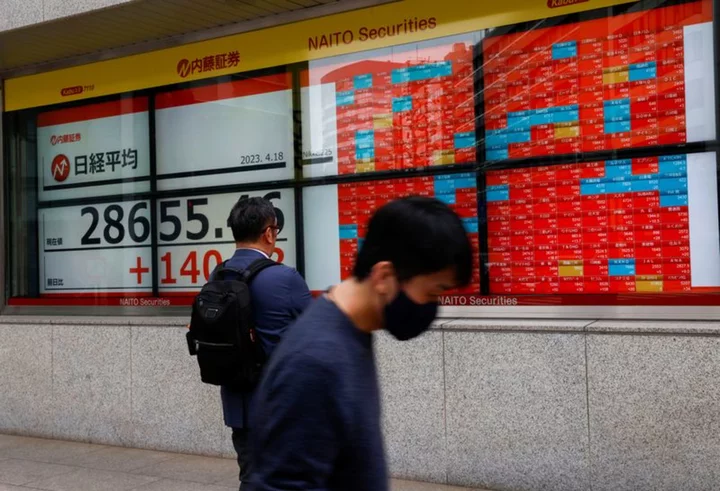By Kevin Buckland
TOKYO Asian shares sank on Tuesday as worries about the Chinese property sector weighed on markets from Hong Kong to Australia, while Japanese investors sold chip stocks on their return from a holiday-extended weekend.
Benchmark U.S. Treasury yields hovered near 16-year peaks and the dollar held close to six-month highs as traders braced for a Federal Reserve rate decision on Wednesday, in a week that also sees policy decisions from the Bank of Japan and Bank of England, among others.
Crude oil continued its rally amid tightening supply, stoking worries about stagflation.
MSCI's broadest index of Asia-Pacific shares slipped 0.3%.
Japan's Nikkei tumbled 1.1% under the weight of big losses for chip-related stocks including Tokyo Electron and Advantest.
Japanese markets were closed Monday, when Asian tech stocks sold off following a Reuters report that TSMC had asked its major vendors to delay deliveries.
That stock sank 0.4% on Tuesday, flipping from an earlier gain of as much as 0.6%. It tumbled 3.2% on Monday.
John Pearce, CIO at Unisuper, called the TSMC news "surprising."
"The one thing you were almost certain of was that demand for semiconductors was only one way," he said.
Hong Kong's Hang Seng declined 0.1%, with a subindex of tech stocks sliding 0.6%. An index of mainland blue chips fell 0.3%.
Chinese property stocks were volatile, with a subindex of Hang Seng developers dropping as much as 1.2% at one point, before flipping to positive territory around lunchtime, although it was last off 0.4%.
Australia's stock benchmark dropped 0.4%, sagging under the weight of mining stocks amid pessimism over Chinese demand.
Providing some rays of hope, though, Country Garden won approval from creditors to extend repayment on another onshore bond, the last in the batch of eight bonds it has been seeking extensions for, sources said.
Peer Sunac China Holdings got creditor approval for its $9 billion offshore debt restructuring plan, the first green light of a debt overhaul by a major Chinese developer.
Weakness in Asian equities weighed on U.S. stock futures, which pointed 0.1% lower. Pan-European Stoxx 50 futures were flat.
Currency markets were subdued, with the U.S. dollar index - which measures the currency against six major peers - rising 0.09% to 105.17, edging back toward last week's six-month peak of 105.43.
The dollar added 0.1% to 147.75 yen, bringing it closer to last week's 10-month top of 147.95.
The euro eased 0.1% to $1.0679.
Ten-year yields were little changed at just above 4.31%, holding close to the 4.366% level reached on Aug. 22, which was the highest since 2007.
"You can't blame people for keeping to the sidelines for now," with the Fed headlining a parade of central bank meetings this week, Kyle Rodda, senior financial market analyst at Capital.com, wrote in a note.
"Given the variability in outcomes, there will inevitably be crosscurrents in the markets," Rodda said. "Price action could be choppy, with risk needing to be managed more carefully."
Traders are all but certain the Fed will leave rates steady again at the conclusion of a two-day meeting that begins later Tuesday, but are split on the chances on another quarter-point increase by year-end.
Fed officials will also release their latest predictions on the economy and where rates are likely to be over the coming quarters.
Meanwhile, oil prices rose in early trade on Tuesday for the fourth consecutive session, as weak shale output in the U.S. spurred further concerns about a supply deficit stemming from extended production cuts by Saudi Arabia and Russia.
U.S. West Texas Intermediate crude futures rose 99 cents, or 1.1%, to $92.47, while global oil benchmark Brent crude futures rose 58 cents, or 0.61%, to $95.01 a barrel. [O/R]
"Given how supply-constrained energy markets are likely to become, especially amidst harsher weather approaching the end of the year, higher oil prices are both an upside risk to inflation and a downside risk to growth," Capital.com's Rodda said.
"Markets that don't export energy and suffer from energy insecurity could underperform."
(Reporting by Kevin Buckland; Additional reporting by Lewis Jackson; Editing by Stephen Coates)

